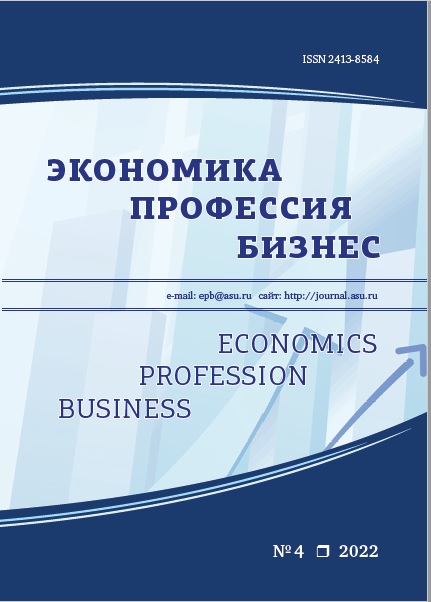IMPORT AT MANUFACTURING ENTERPRISES OF THE ALTAI TERRITORY: ANALYSIS, ASSESSMENT, PROSPECTS
УДК 338.45:339.562
Abstract
An assessment of the situation with import substitution at manufacturing enterprises in the Altai Territory based on an analysis of the effectiveness of foreign purchases carried out by these enterprises is the purpose of writing this article.
The authors used the results of studies by Russian and foreign authors on the strategy and tactics of the behavior of enterprises in matters of importing raw materials, materials, technological equipment and technologies under the sanctions regime introduced by the countries of the European Union and the United States in the period 2017-2022, as well as statistical data from Rosstat and Office of the Federal State Statistics Service for the Altai Territory and the Republic of Altai, materials of the Altai Branch of the Russian Union of Industrialists and Entrepreneurs and data from a survey of industrial enterprise managers.
Using the example of manufacturing enterprises in the region, the actual situation with import supplies is shown at the present time, an assessment is made of the situation with import substitution at innovatively active enterprises. It that as a result of the import substitution policy, the dependence of has been established manufacturing enterprises on foreign supplies has decreased. Nevertheless, work in this direction now needs to be increased, especially, in the opinion of the interviewed heads of Barnaul enterprises, especially modern technologies and equipment based on the formation and implementation of federal programs for the dynamic development of mechanical engineering.
Downloads
Metrics
References
Голикова В. В., Кузнецов Б. В. Стратегии поведения российских предприятий обрабатывающей промышленности в отношении импорта в условиях экономических санкций // Вопросы экономики. 2021. № 7. С. 89-106.
Глазьев С. Ю. Рывок в будущее. Россия в новых технологическом и мирохозяйственном укладах. М., 2018 768 с.
Батяева А. Е. Зависимость отечественных предприятий от импорта: проблемы измерения, основные тенденции и влияние на хозяйственную деятельность компаний // Российский экономический барометр. 2017. № 2. С. 3-12.
Березинская О. Б., Ведев А. С. Производственная зависимость российской промышленности от импорта и механизм стратегического импортозамещения // Вопросы экономики. 2015. № 1. С. 103-115.
Березинская О. Б., Щелокова Д. В. Технологическая зависимость от импорта и перспективы импортозамещения в российской промышленности // Экономическое развитие России. Т. 25. 2015. № 1. С. 20-26.
Алтайский край в цифрах. 2017-2021: крат. стат. сб. / Управление Федеральной службы государственной статистики по Алтайскому краю и Республике Алтай. Барнаул, 2022. С. 157-158.
Гнидченко А. А. Импортозамещение как дополняющая стратегия // Проблемы прогнозирования. 2017. № 6. С. 27-36.
Павлов П. Н., Каукин А. С. Импортозамещение товаров инвестиционного назначения в России // Вопросы экономики. 2017. № 8. С. 92-103.
Белоусов Д. Р., Блохин А. А. и др. Структурно-инвестиционная политика в целях модернизации экономики России // Проблемы прогнозирования. 2017. № 4. С. 3-16.
Клейнер Г. Б., Тамбовцев В. Л., Качалов Р. М. Предприятие в нестабильной экономической среде: риски, стратегии, безопасность // Экономика. М., 1997. 288 с.
REFERENCES
Golikova V. V., Kuznetsov B. V. Behavioral strategies of Russian manufacturing enterprises in relation to imports in the context of economic sanctions. // Questions of Economics. 2021. No. 7. Pp. 89-106.
Glazyev S. Yu. Leap into the future. Russia in the new technological and world economic structures. M., 2018. 768 p.
Batyaeva A. E. Dependence of domestic enterprises on imports: problems of measurement, main trends and impact on the economic activity of companies // Russian Economic Barometer. 2017. No. 2. Pp. 3-12.
Berezinskaya O. B., Vedev A. S. Industrial dependence of the Russian industry on imports and the mechanism of strategic import substitution // Questions of Economics. 2015. No. 1. Pp. 103-115.
Berezinskaya O. B., Shchelokova D. V. Technological dependence on imports and the prospects for import substitution in the Russian industry // Economic development of Russia. Vol. 25. 2015. No. 1. Pp. 20-26.
Altai Territory in numbers. 2017-2021: Brief stat. Sat / Office of the Federal State Statistics Service for the Altai Territory and the Altai Republic. Barnaul, 2022. Pp. 157-158.
Gnidchenko A. A. Import substitution as a complementary strategy // Problems of forecasting. 2017. No. 6. Pp. 27-36.
Pavlov P. N., Kaukin A. S. Import substitution of investment goods in Russia // Economic Issues. 2017. No. 8. Pp. 92-103.
Belousov D. R., Blokhin A. A. Structural and investment policy for the modernization of the Russian economy // Problems of forecasting. 2017. No. 4. Pp. 3-16.
Kleiner G. B., Tambovtsev V. L., Kachalov R. M. Enterprise in an unstable economic environment: risks, strategies, security // Economics of enterprises. M., 1997. 288 p.
Economics Profession Business is a golden publisher, as we allow self-archiving, but most importantly we are fully transparent about your rights.
Authors may present and discuss their findings ahead of publication: at biological or scientific conferences, on preprint servers, in public databases, and in blogs, wikis, tweets, and other informal communication channels.
Economics Profession Business (EPB) allows authors to deposit manuscripts (currently under review or those for intended submission to EPB) in non-commercial, pre-print servers such as ArXiv.
Authors who publish with this journal agree to the following terms:
- Authors retain copyright and grant the journal right of first publication with the work simultaneously licensed under a Creative Commons Attribution License that allows others to share the work with an acknowledgement of the work's authorship and initial publication in this journal.
- Authors are able to enter into separate, additional contractual arrangements for the non-exclusive distribution of the journal's published version of the work (e.g., post it to an institutional repository or publish it in a book), with an acknowledgement of its initial publication in this journal.
- Authors are permitted and encouraged to post their work online (e.g., in institutional repositories or on their website) prior to and during the submission process, as it can lead to productive exchanges, as well as earlier and greater citation of published work (See The Effect of Open Access).









